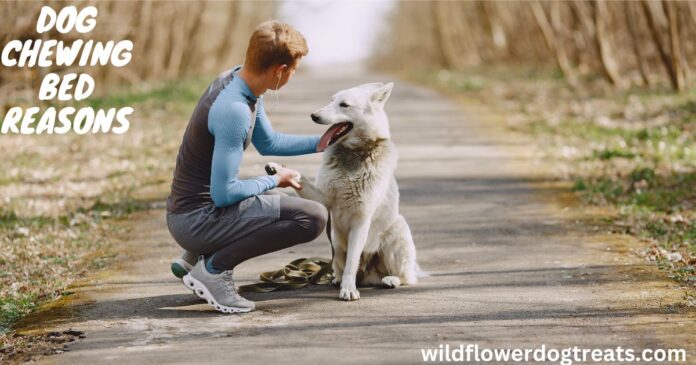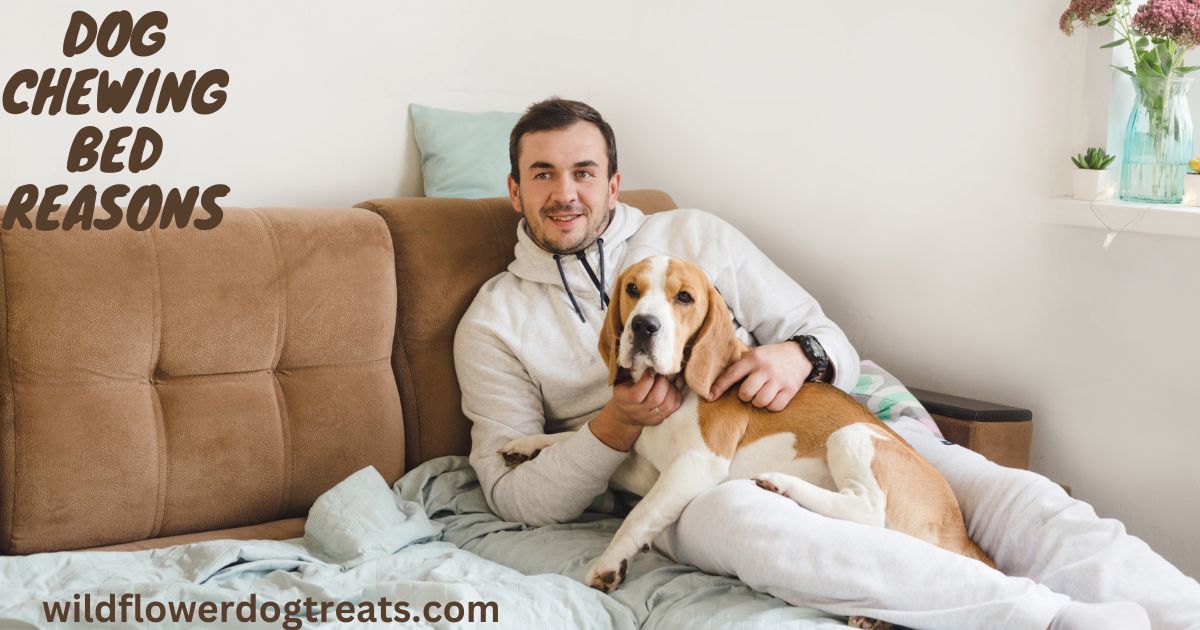Your dog may chew his bed due to boredom, anxiety, or teething. Dog Chewing Bed Reasons. Providing appropriate chew toys and regular exercise can help prevent this behavior.
Understanding the reasons behind your dog’s bed chewing will help you address the issue effectively. As canine companions, dogs remain loyal and loving, but they can also exhibit behaviors that may puzzle or concern their owners. One common behavior that many dog owners face is bed chewing.
This can be frustrating and concerning, especially when you’ve invested in a comfortable bed for your furry friend. However, understanding the reasons behind this behavior and learning effective solutions can help you ensure your dog remains comfortable and content. We will delve into the potential reasons why your dog chews his bed and provide actionable tips to address this issue. Dog Chewing Bed Reasons.
Understanding Your Dog’s Behavior
Wondering why your dog chews his bed? It’s a common behavior that can stem from anxiety, boredom, or teething. By understanding the root cause, you can help address the issue and provide appropriate training and mental stimulation for your furry friend. Dog Chewing Bed Reasons.
Dog Chewing Behavior
The behavior of dogs chewing on their beds can be quite puzzling to many pet owners. However, understanding why dogs exhibit this behavior can help provide valuable insight into their needs and instincts. In this section, we will delve into the reasons behind this common dog behavior and how you can address it effectively.
Natural Instincts
Dogs have a natural inclination to chew, which serves various purposes rooted in their evolutionary instincts. Chewing helps to keep their teeth clean and relieve anxiety and boredom. While modern dogs may not need to hunt for their food, their natural urge to chew remains deeply ingrained in their behavior. Understanding this instinct is crucial in managing and redirecting their chewing habits.
It is essential for dog owners to recognize that chewing is not a sign of disobedience, but rather a natural behavior that can be managed with the right approach. By exploring the underlying reasons for your dog’s chewing behavior, you can take proactive measures to address it in a constructive manner.
Why Does My Dog Chew His Bed
Have you ever wondered, “Why does my dog chew his bed?” It can be frustrating when you provide your furry friend with a comfortable bed, only to find it shredded to pieces. Dog Chewing Bed Reasons. Understanding the reasons behind your dog’s behavior is crucial to finding a solution and preventing further destruction. In this blog post, we’ll delve into the various behavioral and psychological factors that may lead to your dog chewing his bed, offering insights and potential solutions to this common issue.
Behavioral Causes
Behavioral causes can play a significant role in why your dog chews his bed. Understanding these causes can help address the behavior effectively. Some common behavioral causes include:
- Boredom: Dogs left alone for extended periods may resort to chewing as a means of entertainment.
- Teething: Puppies may chew their beds during the teething phase to alleviate discomfort.
- Separation Anxiety: Dogs with separation anxiety may exhibit destructive behaviors, such as chewing, when left alone.
Psychological Triggers
When exploring the psychological triggers that lead to bed chewing, it’s important to consider the emotional well-being of your dog. Some psychological triggers include:
- Stress: Dogs may chew their beds as a coping mechanism for stress or anxiety.
- Comfort-Seeking Behavior: Some dogs chew their beds as a way to self-soothe and seek comfort.
- Territorial Instincts: Dogs may exhibit bed chewing as a way to mark their territory or claim ownership.
Addressing Behavioral Issues
Training Techniques
When dealing with your dog’s bed chewing behavior, it’s crucial to approach it from a training perspective. Utilizing appropriate training techniques can help redirect this behavior and discourage destructive chewing habits. Consider implementing the following training methods:
- Positive Reinforcement: Use treats, praise, and rewards to encourage your dog to chew on appropriate items such as chew toys instead of the bed.
- Consistency: Establish clear boundaries and consistently redirect your dog’s attention to approved chewing items.
- Distraction Techniques: Engage your dog in interactive play or walks to divert their attention away from the bed.
- Supervision: Keep a close eye on your dog, especially during the initial stages of training, to intervene and redirect any bed-chewing behaviors.
Behavioral Modification
Modifying your dog’s behavior requires a proactive and patient approach. By addressing the underlying reasons for bed chewing, you can work towards long-term behavioral changes. Below are several effective techniques for behavioral modification:
- Environmental Enrichment: Provide stimulating toys, regular exercise, and mental stimulation to prevent boredom and reduce the likelihood of destructive behaviors.
- Stress Reduction: Identify and alleviate any sources of anxiety or stress in your dog’s environment through comforting routines, calming activities, and safe spaces.
- Professional Training: Seek guidance from a reputable dog trainer or behaviorist to develop a customized behavior modification plan tailored to your dog’s specific needs.
Providing Proper Stimulation
Providing proper stimulation is crucial in addressing the issue of why your dog chews his bed. Dogs, like humans, need mental and physical exercise to stay happy and healthy. Without adequate stimulation, they may resort to destructive behaviors such as chewing on their beds. By providing the right environment and activities, you can help satisfy your dog’s need for mental and physical exercise, thereby reducing the likelihood of bed chewing.
Mental And Physical Exercise
Dogs need both mental and physical exercise to keep them mentally sharp and physically fit. Regular walks, playtime, and training sessions are essential for addressing your dog’s energy levels. By engaging in activities that challenge their minds and bodies, you can help prevent boredom and destructive behaviors such as bed chewing.
Interactive Toys
Interactive toys provide mental stimulation and entertainment for dogs. Puzzle toys, treat-dispensing toys, and interactive games can keep your dog engaged and satisfied. These toys encourage problem-solving and offer a rewarding challenge for your furry friend. By incorporating interactive toys into your dog’s daily routine, you can redirect their chewing behavior towards more appropriate outlets.
Enriching Your Dog’s Environment
Enriching your dog’s environment with comfortable bedding options and safe and durable toys can help address the behavior of chewing their bed. Dogs, like humans, need mental and physical stimulation to stay happy and healthy. By providing the right environment for your dog, you can prevent undesirable behaviors and promote their overall well-being.
Comfortable Bedding Options
When it comes to choosing the right bed for your dog, comfort is key. Soft and supportive bedding options can make a significant difference in preventing your dog from destructive chewing. Look for durable and chew-resistant materials that can withstand your dog’s natural instinct to chew. Memory foam or orthopedic beds are particularly beneficial for dogs with joint issues or older pets. Providing a comfortable and inviting bed can discourage them from seeking alternative comforts, such as chewing their bed.
Safe And Durable Toys
Safe and durable toys are essential for keeping your dog mentally engaged and satisfied. Look for toys made from natural rubber or hard nylon that are designed to withstand heavy chewing. Interactive toys that dispense treats or require problem-solving can help stimulate your dog’s mind and prevent boredom-induced chewing. Remember to rotate toys regularly to keep the novelty alive and prevent your dog from getting bored.
Frequently Asked Questions On Why Does My Dog Chew His Bed
Why Do Dogs Chew Their Beds?
Dogs may chew their beds due to anxiety, boredom, or teething. Providing proper exercise and toys, and addressing any underlying anxiety, can help curb this behavior.
How To Stop A Dog From Chewing His Bed?
To stop a dog from chewing his bed, provide chew toys, regular exercise, and mental stimulation. Consider using bitter sprays, redirection, and providing a comfortable resting area.
Is Chewing A Sign Of A Health Issue In Dogs?
Excessive chewing in dogs can indicate dental problems, nutritional imbalances, or gastrointestinal issues. Consult a veterinarian to rule out any underlying health concerns for your pet.
Conclusion
In understanding the reasons for your dog’s bed chewing behavior, it’s essential to consider their needs and instincts. By addressing any underlying issues, providing adequate mental and physical stimulation, and using positive reinforcement, you can help curb this behavior. With proper care and attention, you can ensure your furry friend’s well-being and create a harmonious living environment for both of you.




